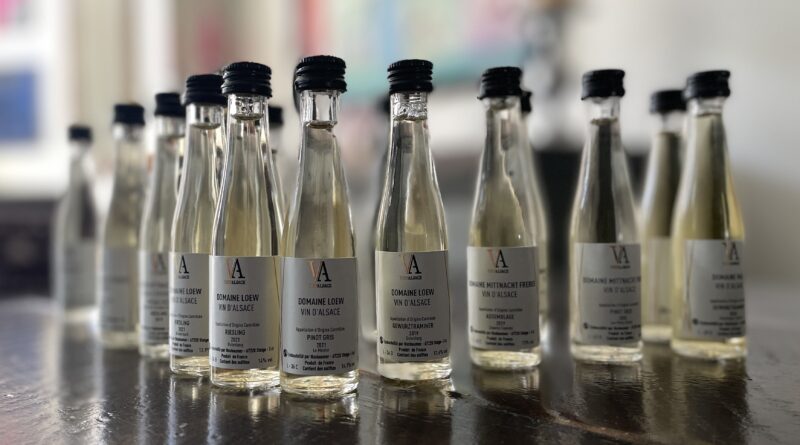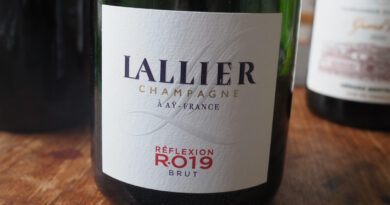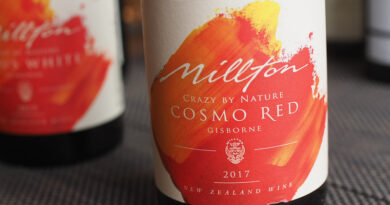Focus: Alsace Riesling
Earlier this year, Conseil Interprofessionnel des Vins d’Alsace (Vins Alsace) held a worldwide Millésimes Alsace DigiTasting, sending out hundreds of sample vials of pre-selected wine to qualified trade / media around the globe. During the 3 days of the virtual show, winemakers from each represented property were available for online conversations and registered masterclasses. Though I was travelling over the days of the sessions, I did taste through all the wines, and was quite impressed (unsurprisingly) with the high quality of the Rieslings. All were very distinct, terroir-transmitting wines. Below are my brief notes on all the Rieslings selected and sampled.
Justin Boxler Riesling Sommerberg Grand Cru 2019, Alsace, France
From the GC Sommerberg and its granitic soils, this wine comes from two plots: Herrenberg, planted in 1979; and the Schorr planted in 1989. After a native ferment, this aged for a year in 100 year old oak barrels, plus aging in bottle prior to release. This is a savoury and intense dry Riesling, shedding most of the fruit (save for lime and lemon pith, and green apple), and cusping into savoury white honey, subtle truffle, and ample flake salts across a brown butter, lees-decked, 13% palate, trailing off into a saline wake. Such a beauty, drinking well now, but will many years in your cellar ahead. 93/100
Domaine Loew Ostenberg Riesling 2021, Alsace, France
Coming from a family of growers in Westhoffen, established in the 18th century, Etienne Loew started his winery in 1996. He is now heading a 22 acres estate, certified organic and biodynamic, and producing a few thousand cases each year. From Riesling rooted in muschelkalk (hard grey limestone, high in Mg) in Ostenberg, this dry Riesling feels in melodic harmony, with yellow and green apple, pear, lemon pith streaming across a crushed stone underlay. There’s a beauty tension and energy here, driving this through a flake salt finish. The low-yielding 2021 has concentrated this special site. Drinking well now, and cellar-worthy. 92/100
Justin Boxler Riesling Pfoeller 2021, Alsace, France
This tight, dry Riesling from the lieu-dit of Pfoeller is rooted in clay-limestone salts, planted in 1976 and 1992. After a native ferment, this ages on on lees for a year in century-old oak barrels. Shimmering with lemon and lime sherbet, green apple, this streaks along the narrow palate like a racehorse. There’s such a tension and deep minerality here, which leaves a long wake on the lingering finish. Just a baby, enjoy now or wait for this in your cellar. 92/100
Domaines Schlumberger Riesling Grand Cru Kitterle 2017, Alsace, France
First noted in 1699, Kitterlé has had an exceptional reputation, noted by name since 1830. This volcanic-sandstone plot is on a steeply sloping rocky outcrop facing south-west, south, and south-east. After whole bunch pressing, this is fermented in stainless, followed by 8 months on lees prior to bottling. This bone dry white opens as rock juice, with medicinal lemon, white cherry, lime pith pulsing along a taut corridor, framed with crushed stone, and lingering with endless salinity. One for purists, and primed for drinking now. 92/100
Domaine Barmès-Buecher Grand Cru Riesling Steingrübler 2020, Alsace, France
Geneviève Buecher and François Barmès established their estate in 1985 by joining the vines of each respective family who had held land there since the 17th century, near the village of Wettolsheim. Today Domaine Barmès-Buecher spreads over 17 biodynamically farmed hectares, scattered over 7 terroirs including 3 Grands Crus: Hengst, Pfersisberg and Steingrubler. This comes from the latter’s calcareous marls and sandstone, and vines around 25 years old. After a native ferment in stainless, this rested 16 months on lees in foudres. Quite potent, with truffle, white honey, lanolin, crushed stones, and flake salts at the fore, with hints of mandarin, and pear skin closing out the finish. There’s an almond bitterness framing this dry wine, which will start cusping into more honeyed nutty notes in future. One for the cellar. 92/100
Domaine Valentin Zusslin Riesling Le Schild 2020, Alsace, France
Established in 1691 by M. Jodocus Cisle (former name of Zusslin), Domaine Valentin Zusslin is now run by two generations of the Zusslin family. The winery is based in Orschwihr, south of Colmar, and the vines are planted on the slopes of the Bollenberg, Clos Liebenberg and Grand Cru Pfingstberg. Since 1997, the estate has been run biodynamically. Le Schild is their newest plot. Tight and nervy, with pear skin, green apple, licks of brown butter, and kisses of lime, this races along the slight palate, with a fine layer of lees to balance the bone dry palate. Lovely fine and nimble energy here. 91/100
Domaine Valentin Zusslin Riesling Clos Liebenberg 2018, Alsace, France
Established in 1691 by M. Jodocus Cisle (former name of Zusslin), Domaine Valentin Zusslin is now run by two generations of the Zusslin family. The winery is based in Orschwihr, south of Colmar, and the vines are planted on the slopes of the Bollenberg, Clos Liebenberg and Grand Cru Pfingstberg. Since 1997, the estate has been run biodynamically. The domaine owns the monopole Clos Liebenberg: a group of plots of almost 4 ha, located on top of the Pfingstberg hill, around 380m. The Clos is surrounded by wild hedges, stone walls, and forest. The nose is enveloped with white truffle and white honey, leading you into crushed flint and stones, roasted nuts, and an evident oxidative character, due no doubt to time in older wood. This is woven with white peach, pear skin, and fine spice, evolving into a lingering salinity on the finish. Certainly distinctive, and about place (not fruit), allow this wine time to open up and reveal itself. 91/100
Domaine Fleith Riesling Steinweg 2018, Alsace, France
In 1996, Vincent Fleith took over his family’s 9 hectares, becoming the 11th generation of winegrowers to caretake these lands. He converted the estate to biodynamics over the next years. This comes off Steinweg’s alluvial granite soils. This golden yellow wine starts off with a lure of flinty reduction, leading into savoury pear skin, yellow apple, and a firm granitic grip rasping the sides. Bone dry, the finish lingers with crushed rocks and apricot blossoms. Drinking very smartly now. 91/100
Domaine Mittnacht Frères Grand Cru Riesling Rosacker 2019, Alsace, France
Founded in 1958, Domaine Mittnacht is a family-run estate led by Christophe and Yuka Mittnacht, with vineyards located around the town of Hunawihr. Christophe was an early pioneer of the biodynamic movement, and the domaine was officially certified biodynamic in 1999, one of the first in Alsace. GC Riesling Rosacker comes from 40+ year old vines, fermented in large older oak. The treatment is felt from first whiff, with a gentle lees decked, expansive nose that carries onto the medium weight palate. Pear skin and flesh, flax, is coated with lees, and kissed with lemon verbena, drawing this out to a stony finish. A subtle GC, but worthwhile listening to. Drinking now. 90/100
Domaine Barmès-Buecher Riesling Clos Sand 2021, Alsace, France
Geneviève Buecher and François Barmès established their estate in 1985 by joining the vines of each respective family who had held land there since the 17th century, near the village of Wettolsheim. Today Domaine Barmès-Buecher spreads over 17 biodynamically farmed hectares, scattered over 7 terroirs including 3 Grands Crus: Hengst, Pfersisberg and Steingrubler. This clos sits on a 40-50% granite mica slope of 350 to 400m, overlooking the village of Wettolsheim. After a native ferment, this spent 10 months on lees. There’s a waxen honeyed stone fruit note that pervades this dry, lighter Riesling, with shavings of apricot skin, tangerine, crab apple pinning in the sides, and lingering on the finish. A severe and uncompromising look at the site, and one purists should enjoy. 90/100
Domaine Loew Riesling Bruderbach Clos des Frères 2021, Alsace, France
Coming from a family of growers in Westhoffen, established in the 18th century, Etienne Loew started his winery in 1996. He is now heading a 22 acres estate, certified organic and biodynamic, and producing a few thousand cases each year. From 26 year old vines planted in sandstone, silica, and iron soils of Bruderbach’s Clos des Frères, this is a sleek, straight, and lean bone dry Riesling rife with lemon and lime sherbet, green apple, and tight saline notes buzzing along the base. Ample energy and vibrancy here. 90/100
Domaine Jean-Marie Haag Riesling Vallée Noble 2019, Alsace, France
About twenty kilometers south of Colmar, Jean-Marie Haag’s vineyards descend from the steep hillsides in this narrow valley called Vallée Noble, closed like a horseshoe. Ample smokey reduction leads this flinty Riesling, which narrows on the bone dry palate to a strict slip, drawing pear skin, apricot fuzz, lemon pith along to a crushed stone finish. Uncompromising wine of place. 90/100
Domaine Jean-Marie Haag Grand Cru Riesling Zinnkoepfle 2020, Alsace, France
From the GC Zinnkoepfle, this Riesling stretches waves of brown butter, ripe pear, white peach fuzz, and lime pith along a lengthy frame, lit with buzzy limestone acidity, and finishing with a lingering salinity. Drinking now. 90/100
Domaine Schoffit Riesling Harth 2020, Alsace, France
Bernhard Schoffit is a young pioneer in Alsace’s Grand Cru Rangen de Thann. The domaine was started by Bernard’s father Robert, with 10 hectares, 30 years ago, Bernard has embarked on an ambitious program of buying nearly 6.5 hectares of very steep land in Rangen, around the Clos St. Theobold, largely abandoned because it was too steep to work. Through much hard work, Bernhard reclaimed all 6.5 hectares. The lieu-dit Harth Riesling was certified organic from 2019, coming off 50 year old vines in Colmar. It was native fermented in stainless, where it remained until bottling. Fleshy pear, white peach is sculpted with lemon verbena, and rides a cushy mid palate of lees and tangerine, finishing with a saline and bitter citrus twist. Brisk, bright, and pleasant, this bone dry Riesling is ready for cracking now. 89/100
Domaine Mittnacht Frères Riesling Les Fossiles 2021, Alsace, France
Founded in 1958, Domaine Mittnacht is a family-run estate led by Christophe and Yuka Mittnacht, with vineyards located around the town of Hunawihr. Christophe was an early pioneer of the biodynamic movement, and the domaine was officially certified biodynamic in 1999, one of the first in Alsace. Ripe yellow apple, perfumed quince, and pear rule this dry, streamlined Riesling, based on lees, kissed by petrol, and finishing with a melon twist. Drinking now. 89/100
Domaine Fleith Riesling 2021, Alsace, France
In 1996, Vincent Fleith took over his family’s 9 hectares, becoming the 11th generation of winegrowers to caretake these lands. He converted the estate to biodynamics over the next years. Pouring a golden yellow, this is heady with ripe pear, honeysuckle, and apricot overtop a flaxen base, finishing quickly with a twirl of sweet jasmine. A fuller style, ready to crack now. 88/100




